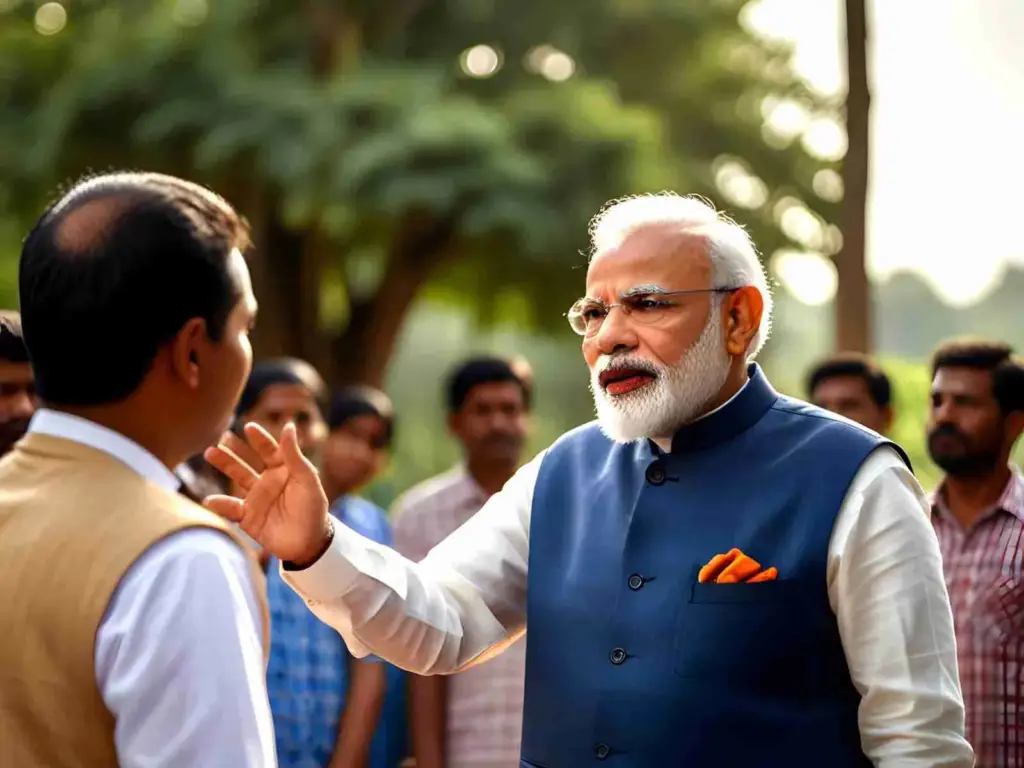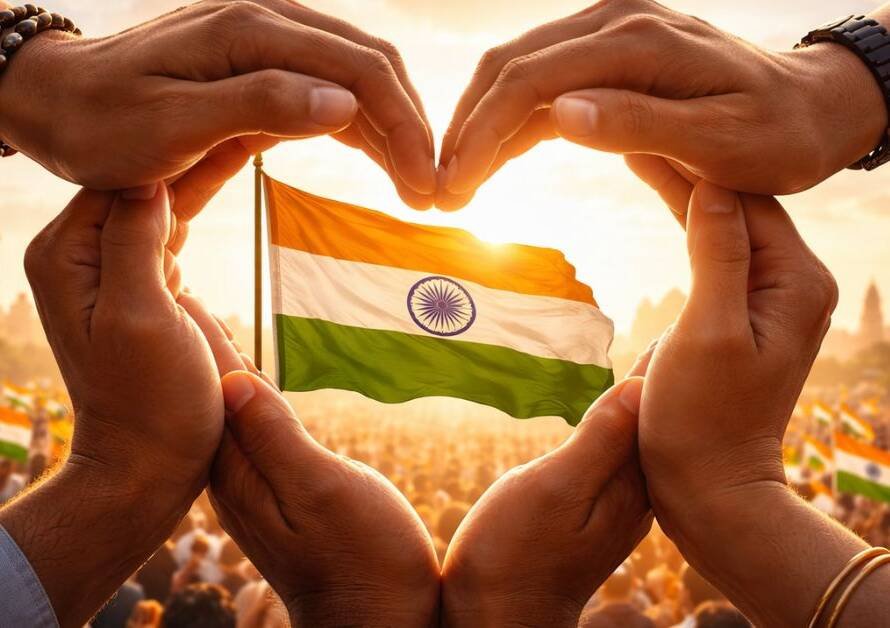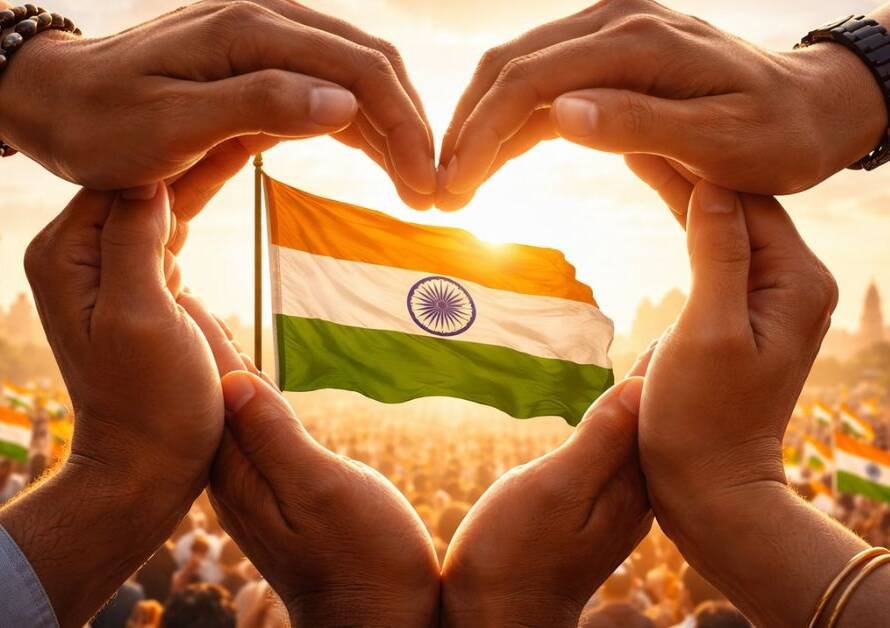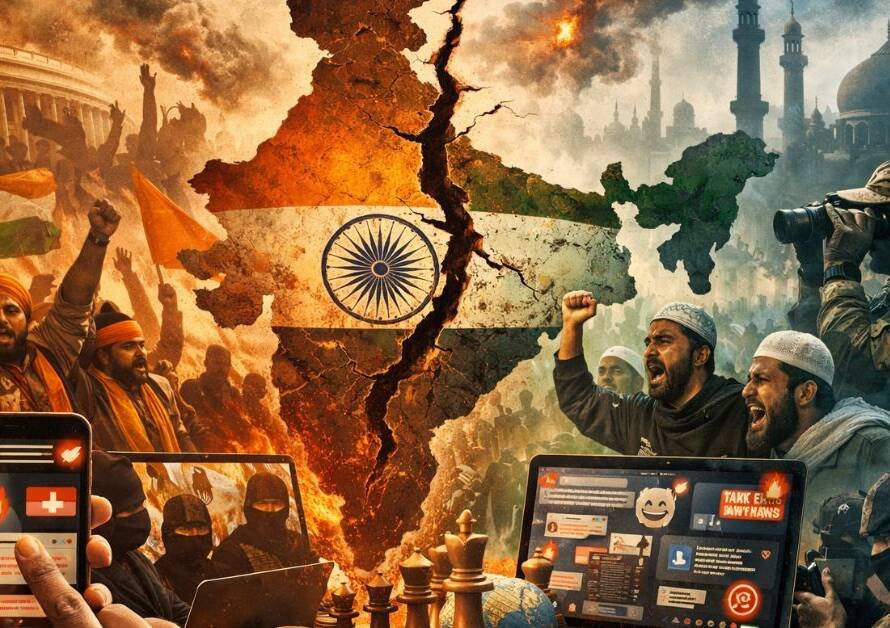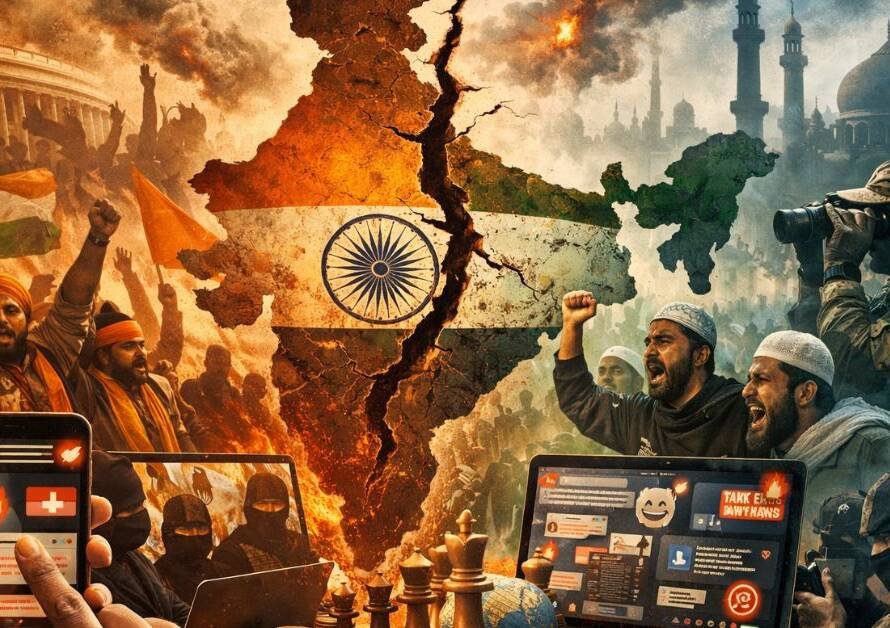Prime Minister Narendra Modi has shown unparalleled determination and courage in governing India and managing international politics. His bold initiatives and diplomatic strategies have elevated India on the global stage, making it one of the fastest-growing economies and a key player in world affairs. Modi’s government is focused on strengthening India, but his efforts are being undermined by a divided Hindu community.
The Real Challenge: Division Among Hindus
The British colonial rulers, followed by the Congress party, have successfully divided Hindus along lines of caste, community, language, and sect. This division has led to internal conflicts among Hindus, distracting them from recognizing the real threats to their religion and country. These threats come from political parties like Congress, the Trinamool Congress (TMC), and the Aam Aadmi Party (AAP), which have been accused of pandering to Muslim voters at the expense of Hindus.
The Muslim community, with the support of these opposition parties, is believed to be pursuing an agenda of Islamization through a “population bomb” and jihad—two powerful strategies aimed at altering the demographic and cultural landscape of India. While the Hindu population remains divided, these forces continue to grow stronger, unchecked.
A Call for Hindu Unity
If Hindus unite and give their full support to Modi and the Bharatiya Janata Party (BJP), the opposition parties like Congress, TMC, and AAP would have no chance of winning elections. With Hindus forming the majority in India, a united vote in favor of the BJP would guarantee victory in both state and national elections. Once in power, Modi can take stronger actions against the spread of radical ideologies, including jihad and the Waqf board’s influence.
The importance of a united Hindu vote cannot be overstated. If Hindus fail to act now, and the country falls back into the hands of opposition parties that appease radical forces, Hindu democracy and culture could be eroded forever. Modi and the BJP offer the only viable path to preserving India’s Hindu identity and ensuring the survival of the Hindu community.
BJP’s Contributions to National Growth and Security
Since coming to power, Modi’s government has taken numerous steps to secure India’s future. Under his leadership, India has achieved:
The construction of the Ram Mandir in Ayodhya.
The implementation of the Citizenship Amendment Act (CAA) and National Register of Citizens (NRC).
The abrogation of Article 370, strengthening India’s sovereignty over Kashmir.
The strengthening of defense capabilities and maintaining peace in volatile regions like Kashmir.
An emphasis on technological advancements, making India a global leader in mobile manufacturing, space exploration, and infrastructure development.
Additionally, under Modi, corruption at the ministerial level has been virtually eliminated, and India has become the world’s fifth-largest economy. The introduction of landmark policies like the New Education Policy, Ayushman Bharat, and 100% electrification of Indian Railways has significantly improved the quality of life for millions of Indians.
Opposition Parties and Their Vote Bank Politics
The opposition, particularly Congress, TMC, and AAP, has consistently worked against Hindu interests. Their focus has been on appeasing Muslim voters through policies that favor radical elements, such as the unchecked expansion of the Waqf board’s powers. The Waqf board’s unchecked claims over properties—including high-profile cases like the claim on Ambani’s residence—demonstrates their growing influence.
These opposition parties have weakened the nation from within by promoting divisive politics and enabling the Islamization of certain regions. In states like West Bengal, under Mamata Banerjee’s leadership, there has been an alarming rise in communal violence, with Muslims gaining control over key governance systems.
The Danger of Inaction: Learning from History
Hindus must not forget the atrocities committed during the partition of India and the more recent Hindu genocide in Bangladesh. During these massacres, attackers did not ask for caste, sect, or community—Hindus were targeted simply because of their religion. The same fate could befall Hindus in India if the current trajectory continues, particularly in regions like West Bengal.
It is crucial for Hindus to recognize that the opposition’s goal is to weaken Hinduism and divide its people. Every election counts, and in the upcoming state and national elections, Hindus must vote en masse for the BJP and its allies. Only a strong, united Hindu vote can ensure the survival of Hindu culture and protect India from the forces that seek to destroy it.
Economic Boycott as a Strategy
Beyond voting, Hindus can take further action by implementing economic boycotts. Avoid buying products or using services offered by businesses that support radical elements or oppose Hindu interests. Economic pressure can weaken the opposition’s influence, while supporting businesses aligned with nationalist values strengthens the Hindu community’s economic standing.
The Global Perspective
This problem is not limited to India. The spread of radical ideologies has made the world an increasingly unsafe place. Many countries are grappling with similar challenges, and some have implemented effective strategies to address these issues. Understanding how other nations are dealing with these threats can offer valuable lessons for India as well. The next step is to study these examples and adapt them to the Indian context.
A Plea for Action
I urge every Hindu to recognize the gravity of the situation. This is not just a political struggle—it is a fight for the survival of Hinduism and the values of humanity, morality, and ethics that are the foundation of Sanatan Dharma. Radical ideologies based on hatred and destruction, as propagated by certain interpretations of the Quran, threaten to overrun these values. While the Quran also contains teachings of peace, its application in jihadist movements has become a global threat.
This is a fight between good and evil, between humanity and cruelty. Hindus must wake up, think critically, and take action to support the Hindutva movement. The time for passive forwarding of messages is over. We need concrete actions, and I call upon dedicated individuals to come forward and join this cause.
The Urgency of Unity
The recent poor mandate in the Lok Sabha elections has already hurt us, emboldening radical elements and opposition parties. However, Modi has continued to steer India toward greatness despite these challenges. With your support, he can do even more to protect Hinduism and build a stronger, more unified nation where all religions can coexist peacefully, as envisioned by our Sanatan Hindu Dharma.
Conclusion: The Path Forward
It’s high time Hindus unite and take decisive action. The survival of Hinduism, and indeed the safety and security of future generations, depends on what we do today. We must vote in large numbers, support the BJP, and ensure that opposition parties are ousted from power. Leaders like Modi, Yogi, and the RSS are working tirelessly to safeguard our future, but they need our support. Let us not be fooled by the false narratives of the opposition.
Jai Hind, Jai Bharat!
How to Unite Hindus: Uniting Hindus, who have historically been divided by caste, region, language, and sect, requires a multifaceted approach. Here are several key strategies to help bring Hindus together around common cultural, social, and political goals:
- Promote a Pan-Hindu Identity
Focus on Common Values: Highlight shared cultural and spiritual values such as respect for Sanatan Dharma, non-violence, tolerance, and respect for all religions. Stress the core principles that unify different Hindu sects and communities.
Encourage Cross-Caste Cooperation: Break down caste barriers by promoting inter-caste cooperation in social, religious, and political spheres. Advocate for a caste-free Hindu identity by emphasizing the teachings of figures like Swami Vivekananda, who promoted unity across divisions.
Celebrate Festivals Together: Promote large-scale, inclusive celebrations of Hindu festivals like Diwali, Holi, and Makar Sankranti across caste and regional lines to build a sense of unity. - Enhance Hindu Education and Awareness
Revive Interest in Sanatan Dharma: Organize educational campaigns in schools, temples, and communities to teach young Hindus about their heritage, scriptures, and contributions of saints and leaders across India. Ensure that Hindu teachings are not restricted to a narrow sect or region but represent a broader, inclusive approach.
Combat Misinformation: Use social media, conferences, and workshops to counter misinformation about Hinduism and address historical distortions, especially those that have led to internal divisions. Encourage intellectual discourse about Hindu history and contemporary challenges.
Highlight Historical Unity: Use examples from history, such as India’s resistance to colonialism and invasions, where different Hindu communities united to defend their land and culture. - Strengthen Religious and Spiritual Institutions
Support Temples and Gurus: Temples, ashrams, and spiritual leaders have always played a key role in shaping Hindu society. Encourage these institutions to take up the cause of unity and speak out against divisions. Prominent saints, religious leaders, and spiritual teachers should be urged to promote unity in their teachings.
Inter-Sect Dialogues: Foster dialogues between different Hindu sects—Shaivism, Vaishnavism, Shaktism, etc.—to find common ground and reduce sectarian differences. - Use Social and Digital Media for Outreach
Social Media Campaigns: Leverage the power of social media platforms like Facebook, Twitter, and Instagram to create campaigns and movements that promote Hindu unity. Share positive messages about Hindu culture, history, and common goals to influence young people and bridge divides.
Create a Unified Digital Platform: Build an online platform where people from different Hindu backgrounds can engage in discussions, share resources, and organize events that foster unity. This can include forums, webinars, and virtual pujas that involve Hindus from across the globe.
Counter Divisive Narratives: Actively challenge online propaganda that seeks to divide Hindus based on caste, region, or language. Promote a unified, forward-looking vision for the Hindu community. - Mobilize Politically for Hindu Causes
Encourage Voting for Common Interests: Organize voter registration drives and encourage Hindus to vote for parties or candidates that prioritize the preservation of Hindu culture, security, and values. Stress the importance of political unity to prevent fragmentation along caste or regional lines.
Advocate for Unified Hindu Leadership: Promote strong leadership that transcends regional and caste identities, focusing instead on common goals such as the protection of Hindu culture, education reform, and economic development. - Empower Hindu Organizations and Movements
Support Social Organizations: Encourage people to join or support organizations like the Rashtriya Swayamsevak Sangh (RSS), Vishwa Hindu Parishad (VHP), and other Hindu social service groups that work toward unity and welfare. These organizations can provide a platform for social service and activism.
Unite Around Key Issues: Hindus can rally around common causes like protecting Hindu temples, preventing forced religious conversions, and ensuring the equal application of laws like the anti-cow slaughter or temple autonomy laws. - Foster Economic and Community Cooperation
Support Hindu-Owned Businesses: Promote economic cooperation by encouraging Hindus to support businesses owned by people from their community. This can build economic resilience and mutual dependence, which can foster unity.
Organize Community Services: Jointly organize charitable activities like feeding the poor, running healthcare camps, or educational support for underprivileged Hindus across caste or community lines. Shared community service creates bonds and reduces divisions. - Promote Inclusive Social Reform
Address Caste-Based Inequality: Work toward eliminating caste-based discrimination within Hindu society by emphasizing the equality of all human beings, as taught by Hindu scriptures like the Bhagavad Gita. Promote inter-caste marriage and education reforms to break down barriers.
Uplift Marginalized Communities: Advocate for the upliftment of Scheduled Castes (SC), Scheduled Tribes (ST), and Other Backward Classes (OBC) within the Hindu fold, ensuring that they feel a part of the larger Hindu society and not isolated. - Celebrate Hindu Diversity
Recognize Regional Traditions: Respect and celebrate the regional variations within Hinduism, such as distinct forms of worship in Tamil Nadu, Bengal, Maharashtra, etc., while emphasizing the overarching unity of all Hindus.
Cultural Exchange Programs: Organize programs that encourage the exchange of cultural practices and traditions among Hindus from different parts of India. This helps in appreciating the rich diversity within Hinduism while reinforcing common values. - Create a Sense of Urgency and Responsibility
Highlight Common Threats: Emphasize the challenges that threaten Hindu survival, such as religious conversions, radical ideologies, or demographic changes. Stress that Hindus must unite for the preservation of their culture and religion.
Call for Collective Action: Create a sense of urgency by pointing out the consequences of inaction. Use historical examples of times when disunity led to losses for the Hindu community (e.g., during invasions or partition).
Conclusion: A Unified Hindu Future
Hindus must come together across caste, language, and regional lines to preserve their cultural heritage and religious identity. Unity can be built on shared values, political mobilization, social reform, and the promotion of economic and community cooperation. By recognizing the common threats they face and working collectively, Hindus can ensure a future of strength, peace, and cultural continuity for generations to come.
Jai Hind!

